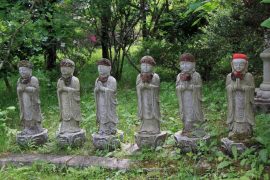The english translation of Haruki Murakami’s much-anticipated new novel, Colorless Tsukuru Tazaki and His Years of Pilgrimage, finally made it into the stores this week. Was it worth the wait?
 Ed Wright in The Weekend Australian: “Colorless Tsukuru Tazaki and His Years of Pilgrimage shows that what looks like success from the outside often looks quite different from the inside, and that perfection is a temporary state. It is something of that ilk that powers Tsukuru’s journey through this novel. The novel is far from perfect. With at least a couple of subplots that venture off nowhere, it seems almost consciously imperfect. Yet the limpid movement of the narrative and the delicacy of the hinges Murakami uses to put his plot together impart the sense that we’re in the hands of a master. Putting beauty into the fault lines, Colorless Tsukuru Tazaki and His Years of Pilgrimage is literature infused with the spirit of wabi-sabi.” Full Review
Ed Wright in The Weekend Australian: “Colorless Tsukuru Tazaki and His Years of Pilgrimage shows that what looks like success from the outside often looks quite different from the inside, and that perfection is a temporary state. It is something of that ilk that powers Tsukuru’s journey through this novel. The novel is far from perfect. With at least a couple of subplots that venture off nowhere, it seems almost consciously imperfect. Yet the limpid movement of the narrative and the delicacy of the hinges Murakami uses to put his plot together impart the sense that we’re in the hands of a master. Putting beauty into the fault lines, Colorless Tsukuru Tazaki and His Years of Pilgrimage is literature infused with the spirit of wabi-sabi.” Full Review
Mark Lawson in The Guardian: “All the author’s signature flourishes are here, including a significant piece of music (Liszt‘s Le mal du pays underscores this novel), an impressive range of cultural reference … and a deep interest in sex. Central to the narrative is Tsukuru’s recurrent wet dream featuring his two estranged women friends. Even given Murakami’s previous explorations of erotic psychology, this novel goes into dark areas including the possibilities of dream rape, subconscious bisexuality and accidental mental necrophilia: what is the morality of having had masturbatory fantasies about someone who turns out to have been dead during the period of your imaginary relations? … Although as adept as ever at setting up Kafkaesque ambiguity and atmosphere, he disappointingly chooses to leave most of the mysteries unresolved.” Full review.
Patti Smith in The New York Times: “On a first reading, Colorless Tsukuru Tazaki and His Years of Pilgrimage seems kin to Murakami’s more minimalist novels Sputnik Sweetheart or Norwegian Wood, but it does not really fall into that category. Nor is it written with the energetic vibe of Pinball, 1973 or in the multidimensional vein of his masterpiece, The Wind-Up Bird Chronicle. Here and there realism is tinged with the parallel worlds of 1Q84, particularly through dreams. The novel contains a fragility that can be found in Kafka on the Shore, with its infinite regard for music. Hardly a soul writes of the listening and playing of music with such insight and tenderness. … This is a book for both the new and experienced reader. It has a strange casualness, as if it unfolded as Murakami wrote it; at times, it seems like a prequel to a whole other narrative. The feel is uneven, the dialogue somewhat stilted, either by design or flawed in translation. Yet there are moments of epiphany gracefully expressed, especially in regard to how people affect one another.” Full review
Chris Foran in the The Milwaukee Sentinel: “Considering the otherworldliness of Murakami’s most recent novels — Kafka on the Shore, After Dark, the mammoth 1Q84 — Colorless is almost jarringly down-to-earth. No talking cats, no twin moons in the sky, no vanishing elephants. In fact, the tone is often neutral, if deceptively so. One of Murakami’s most endearing and enduring traits as a writer is an almost reportorial attention to detail, the combined effect of which gives you a complete picture while still feeling a little ethereal. Because, like many of the award-winning novelist’s best books, Colorless also is rooted in dreams. Tsukuru relates dark fantasies involving the people in his past in such a matter-of-fact way that the character himself isn’t sure they’re not real. As always with Murakami, it doesn’t really matter if they are real: It’s the feelings they evoke that matter. Like many of Murakami’s best novels — especially his landmark coming-of-age novel, Norwegian Wood — Colorless is also rooted in music.” Full review.
Matthew Carl Strecher, the author of three books on Murakami, rates Colorless Tsukuru Tazaki as number five on his Top Ten, which are listed below. Writing in Publishers Weekly he explains why. 1. A Wild Sheep Chase; 2. The Wind-up Bird Chronicles; 3. Hardboiled Wonderland and the End of the World; 4. 1Q84; 5. Colorless Tsukuru Tazaki and His Years of Pilgrimage. 6. Kafka on the Shore. 7. Hear the Wind Sing; 8. Pinball 1973; 9. Norwegian Wood; 10. Dance Dance Dance.
Colorless Tsukuru Tazaki and His Years of Pilgrimage by Haruki Murakami published by Harvill Secker.

Comments are closed.